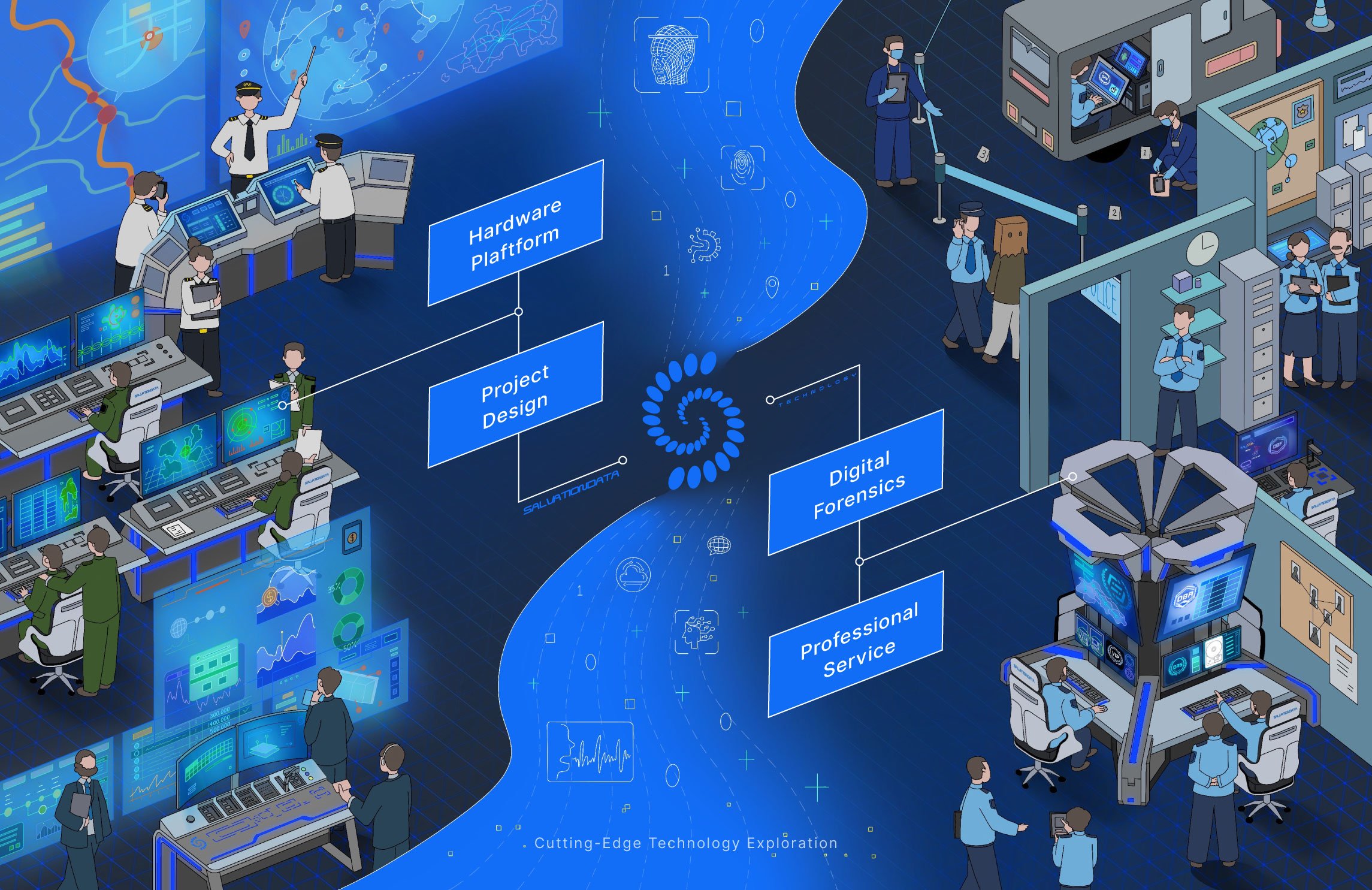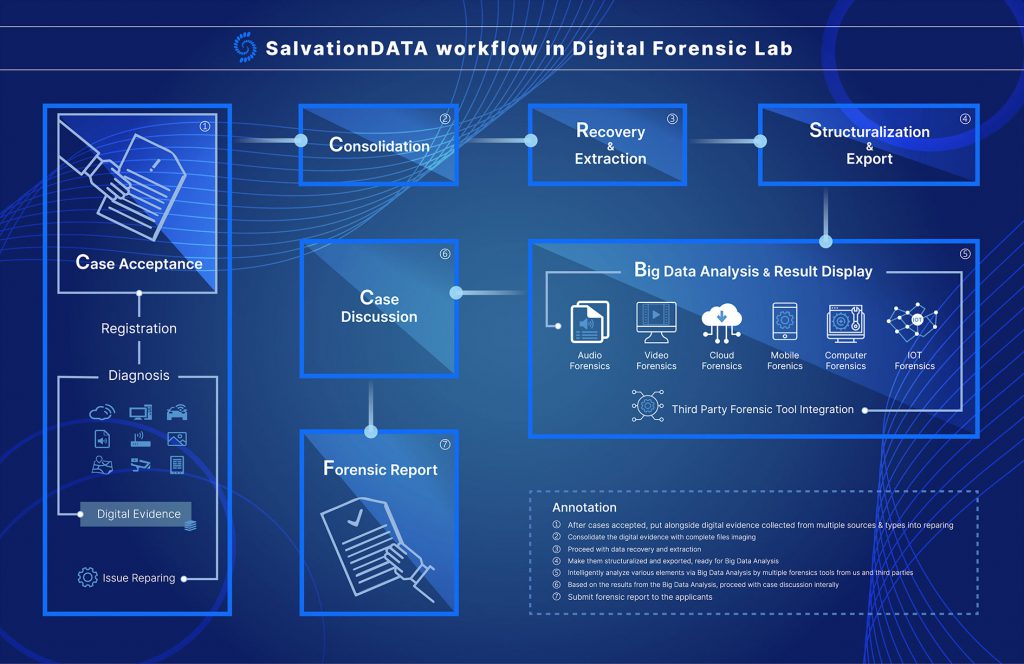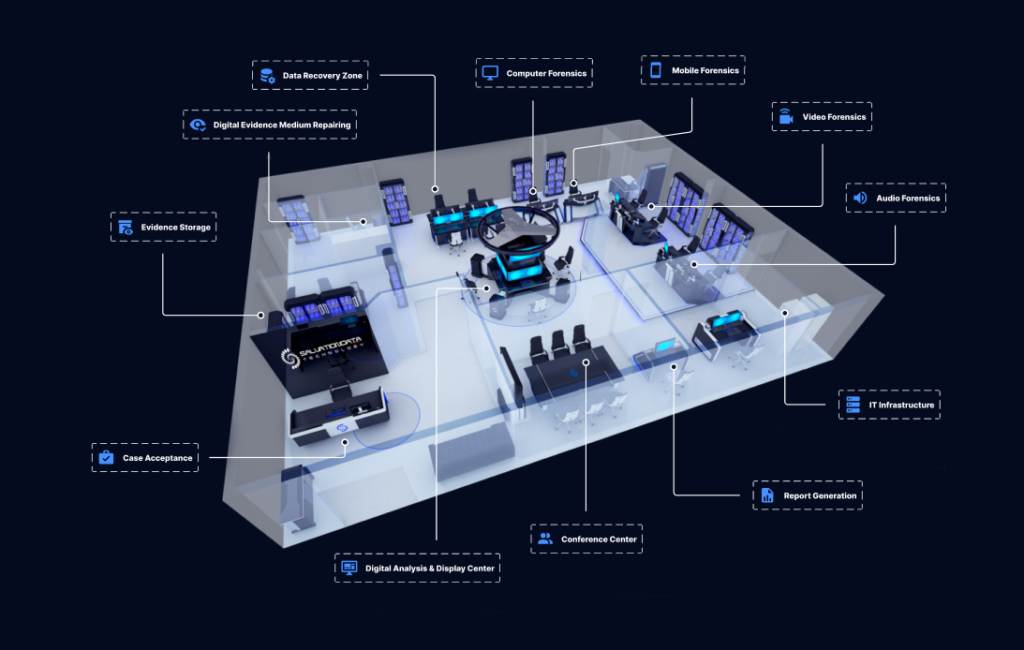What Is Digital Forensics Lab?

-
Content
- The Necessity of Digital Forensics Lab
- How Does a Digital Forensics Lab Function?
- What Do You Benefit from Digital Forensics Lab?
- When Do You Need a Digital Forensics Lab?
- How to Get Started with Digital Forensics Lab?
- Conclusion
-
Content
- The Necessity of Digital Forensics Lab
- How Does a Digital Forensics Lab Function?
- What Do You Benefit from Digital Forensics Lab?
- When Do You Need a Digital Forensics Lab?
- How to Get Started with Digital Forensics Lab?
- Conclusion
The Necessity of Digital Forensics Lab
Technology Evolving
Technology is evolving fast, even the apps in your mobile phone get updates almost every other day. However, they’re not the only ones evolving fast, so do hardwares and softwares.
With the fast evolution of technology, it is beyond the capacity of investigators to keep up with every new development. In this rapidly changing environment, it is necessary for law enforcement organizations to keep their knowledge and technology updated in order to match and outsmart new-era criminals.
Efficiency and Availability
We live in a world of digital devices. Be it our smartwatch, smartphone, or even our oven in the kitchen, digital devices generate digital data every moment, creating tremendous amounts of data. Such large amounts of data are impossible to analyze manually, and using single inefficient digital forensic tools is likely to create more frustration.
Modern-day law enforcement agencies and investigators need an integrated digital forensics lab that can improve the efficiency, accuracy, visualization, and legibility of digital evidence.
Public Credibility
Moreover, not only does the lack of a digital forensics lab make today’s investigations very inefficient and ineffective, it does even more: it tarnishes the public image of the law enforcement agencies, since people are used to seeing high-tech forensic labs in film and TV, which are the same appeals they expect for their cities!
How Does a Digital Forensics Lab Function?
1. Rigorous And Scientific Workflow For Digital Evidence
Large amounts and the increasing complexity of digital evidence make it impossible to be organized in files and folders simply. However, modern forensic labs follow rigorous and scientific workflow for digital evidence by being equipped with cutting-edge hardwares and softwares to enable law enforcement agencies to streamline their workflow.
Take SalvationDATA’s Digital Forensic Lab solution for instance, it would follow the functions of rigorous and scientific workflow as below for digital evidence
A) Case Acceptance
In law enforcement, the work of digital forensics doesn’t start after case registration, but it often starts before it. The first function of any digital forensic lab is to support the groundwork for case acceptance. You must analyze the initial evidence and record statement, and all this should be done in a streamlined and forensically sound manner.
B) Consolidation
Without consolidation, it’s unable to efficiently rummage files and folders for the relevant data among various digital evidence from different sources during the digital forensic investigation. A digital forensic lab facilitates the consolidation of the gathered data making it easier to integrate the overall digital evidence.
C) Recovery & Extraction
Digital devices don’t hand over their data so easily. In fact, digital forensic evidence is only valuable when it can be seen and analyzed by digital forensic experts, though that is only possible with proper recovery and extraction of the data.The reason why it’s being said is due to digital devices that have different hardware, file systems, operating systems and different methods of protecting data.
It is an important function of a digital forensic lab to recover and extract data in a forensically sound manner by integrated digital forensic tools.
D) Structuralization & Export
A qualified digital forensic lab would always structualize the ready integrated data after the previous process at this stage, since the following analysis work would always require unified formats to process automatically and systematically, which also means a reliable digital forensic lab is required to be compatible with various packing formats for the integrated data.
Then, the structuralized data would be exported for analysis.
E) Big Data Analysis & Result Display
When it comes to analyzing the data, a qualified digital forensic lab should be provided with all essential digital forensic tools to extract and analyze mass valuable digital evidence and conclude meaningful results that aid in judicial proceedings.
Big Data Technology in Digital Forensics to support the analysis of the digital evidence and its result displayed visually is no doubt speeding up the process and enhancing the possibilities of detectable clues.
F) Case Discussion
After all the vital processes, digital forensic investigators are supposed to discuss the case among different stakeholders, certain departments in the law enforcement agency, for example, to be on the same page and get the most out of the available digital evidence and its analysis results.
G) Forensic Reporting
Eventually, though writing reports in a forensically sound manner is a time-consuming, tedious task and the hardest part of the digital forensic process for many investigators, it’s one of the most important things we must focus on, in case of any inadmissible evidence submitted in court.
In fact, manually keeping the track of every step taken during the digital forensic process is almost impossible. Fortunately, well-designed digital forensic labs have scientific reporting functions that automatically record the history of the steps and results and generate reports according to the legal requirements.
2. Cutting-Edge Hardware and Software
Digital devices are evolving fast, and it is necessary for digital forensic labs to use the latest supporting tools and equipment to proceed with the digital evidence stored and processed reliably.
The following are the software and hardware tools to achieve an efficient forensic workflow in SalvationDATA.
- Hardware
- Forensic Workbench
- Intelligent forensic workstation
- Intelligent data analysis and visualization center
- Security locker
- Conference Center
- IT infrastructure: Server, UPS, LAN
- Software
- Video Forensics
- Mobile forensics
- Computer forensics and data recovery
- Audio forensic
- Assistant System
-
- Access control system
- CCTV surveillance system
- Case Management System
Though equipment solutions in digital forensic labs vary from contractors, we only put forward our solutions based on more than 20 years experience in digital forensics for more law enforcement agencies and officers to be aware and refer to.
3. The automation of a digital forensic lab
There are many functions for a digital forensic lab. From case acceptance to presenting the evidence in the court of law, each function requires precise handling and documentation.
To enhance the efficiency and accuracy, automation is a necessary part of modern digital forensic labs to perform all the functions.
Furthermore, it ends up increasing the admissibility of the evidence to some extent!
What Do You Benefit from Digital Forensics Lab?
Having a modern digital forensic lab has a lot of obvious benefits, but there are some additional benefits that are not so obvious at the first glance. Yet, when planning a new digital forensic lab, you must consider all factors to make an informed decision.
Following are some notable benefits of having a new digital forensic lab in your department.
1. Updated Knowledge
The Digital forensic lab consultants, the companies and contractors that support you to set up the digital forensic lab for your agencies and departments, offer the latest digital forensics tools and equipment with trending digital forensic technologies as well as the essential training needed to maintain the expertise up to date for you and your personel.
2. Higher Clearance Rate
Every law enforcement agency strives to achieve a high clearance rate: the percentage of solved cases as compared to the unsolved ones.
Because digital evidence plays a vital role in most of today’s crimes, setting up a modern digital forensic lab enables you to crack a higher number of cases.
3. Modern Environment
The modern environment and workflow increase the efficiency and effectiveness of the digital forensic process. With a modern and streamlined workflow, your department can achieve a lot more with fewer personnel requirements.
4. Increased Credibility
Public perception is very important for any government, and people want to know that their government is doing everything to protect them. Having old, disorganized, and poorly equipped digital forensic labs leaves the impression that the government is not paying attention to the protection of its citizens.
When Do You Need a Digital Forensics Lab?
Deciding to have a new digital forensics lab or updating an existing one is a huge decision that needs resources in terms of time, funds, and human resources. Thus, it is important to weigh all factors carefully before investing in a digital forensic lab of your own.
Though the situation in every law enforcement agency is different, pay special attention to the following factors we conclude.
1. Outdated Digital Forensics Equipment
Have a critical look at the current equipment in your digital forensic lab and answer the following questions.
- When was the last time you updated your hardware and software and are they up-to-date ?
- Are your tools and equipment comprehensive and integrated enough for efficient and scientific operation ?
- Are you able to extract evidence from the myriad of today’s digital devices in a forensically sound manner?
- Has your digital evidence been rejected and inadmissible by the court of law due to compromised integrity and incredibility?
We suggest you answer the above questions at the very beginning for the necessity of a new digital forensic lab.
2. High Case Volume
Most law enforcement agencies face high case volume, and the delay in the processing of digital evidence is one major cause of backlogs.
If the personnel in your department are not able to cope with the number of cases, it is a sign that your department needs a digital forensic lab.
A digital forensic lab will outstandingly improve the work with the same or even less energy and human resource.
3. Increasing Crimes Related to Digital Evidence
The relevance of digital evidence is increasing in multiple ways, and some kind of digital evidence is surfacing in almost every case. In addition to the increasing relevance, cybercrimes, crimes of mostly digital nature, are on the rise.
If your department is witnessing many cases where digital evidence is an important factor, it might indicate the need for a digital forensic lab.
How to Get Started with Digital Forensics Lab?
Getting started with a digital forensics lab is easy, but knowing some important points makes it a lot more productive. The following are the points that you should keep in mind while getting started with the digital forensic lab.
1. Necessity: Self-assessment
Self-assessment done at the right time can save you considerable time and resources down the road. When making an assessment, discuss the condition and circumstances of the current digital forensic equipment, within your department and other stakeholders.
You should make sure that the new equipment you intend to buy is capable of doing not only all the things you’re currently doing , but those that haven’t, being in a more efficient manner.
2. Find a Digital Forensic Lab Contractor
There are multiple sources to find a suitable digital forensics lab contractor. Many law enforcement agencies select a contractor to construct their digital forensic lab based on word of mouth and their local digital forensics agencies. It is a source, but you should also use other sources, like internet research including Google, Social Media, Youtube etc, to find out the best digital forensic lab contractor and make sure your queries have been completely figured out after consulting with them.
3. Set Up the Digital Forensic Lab
While your contractor sets up the digital forensics lab for you, you should keep constant communication and provide regular feedback on the work being done. This will ensure that you end up with a digital forensic lab that suits your current and near-future needs.
4. Training, Maintenance, and Upgrade
Though training, maintenance, and upgrade are often executed after the completion of the digital forensics lab, you should plan them when signing the contract with your digital forensic lab contractor. Please remember that even the most advanced and expensive lab will not be able to fulfill its intended purpose without personnel training and regular maintenance and upgrades.
In case you’re really implementing your digital forensics lab, check this quick detail instruction for the overall set-up process, to make sure all essentials are completely under consideration and you should be getting works done very quick!
Conclusion
A digital forensics lab plays an important role in the effective handling of digital forensic evidence, and consequently, in the success of law enforcement agencies and their personnel.
By comprehensive examination on your law enforcement agencies, digital forensics workflow and circumstances, more hints on the necessity of a new digital forensic lab is going to be concluded.
However, setting up a modern digital forensic lab requires high levels of technical knowledge and years of experience. Not many law enforcement agencies have such expertise and it is highly recommended to consult a reputed digital forensic lab consultant that can help you set up the forensic lab according to your needs.



